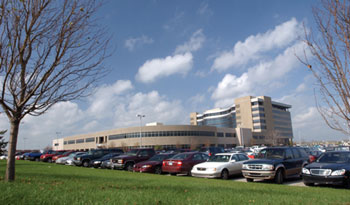KANSAS SPOTLIGHT
Turning Toward

|
| GPS navigation system designer and manufacturer Garmin Ltd. has steadily added to its payroll and facility footprint since choosing Olathe for its headquarters in 1989. The company recently formed a partnership with fellow K.C.-area company Sprint Nextel. |
Kansas
| T |
he two-state Greater Kansas City metro continues to make sense for many corporate moves, from headquarters to manufacturing sites. Those include moves to Kansas City, Kan., Johnson County and outlying towns that now find themselves suburbs.
Some say that label applies to such cities as Lawrence — home to the University of Kansas — and even the state capital of Topeka, which is welcoming multiple food processing projects even as food processors reported "lackluster conditions" as recently as September. Food and energy are fueling other growth in the state too, including ethanol plant development.
In the meantime, a swath of 9,065 acres in that exurb territory along Highway K-10 is headed for some major redevelopment, begun with an official groundbreaking in mid-October.
'Ah, Sunflower'
The sunflower has been the official state flower for 100 years, and along with a buffalo adorns the state's new quarter. A whole lot of those quarters will be needed to spruce up the Sunflower Army Ammunition Plant, but progress is occurring. In July 2005, an agreement was reached among the state, the City of De Soto, Johnson County, the University of Kansas, Kansas State University and a new joint venture called Sunflower Redevelopment LLC to clean up and redevelop the property.
"After years of negotiations and false starts, I am excited to announce today that an agreement has been reached that will transform the Sunflower Army Ammunition Plant into a powerful engine for economic growth in Northeast Kansas," said Governor Kathleen Sebelius on July 28. "With this agreement in place, the Sunflower Redevelopment LLC firm can move ahead on transforming this site, with its ammunition production history, into a center for world-class scientific research and innovative economic development that will benefit all Kansans."
Sunflower Redevelopment is a venture between Kansas City, Mo.-based developer Kessinger-Hunter and Littleton, Colo.-based International Risk Group. The cleanup alone is expected to take until 2012. A $109-million contract for remediation and explosives contamination was awarded by the Dept. of Defense in August 2005. But some project the total cleanup cost to be nearer to $200 million, with $50 million in environmental insurance alone.
The joint venture was originally awarded the contract in 2004, but the approval needed to be reaffirmed by the Johnson Co. Board of County Commissioners early in 2005 because of a new federal law passed in October 2004 that allows property transfers to be made directly to developers with the need for a county to take title of the site. What's more, federal funding can also flow to the project without county involvement. Sunflower Redevelopment plans to develop the site to residential standards at no cost to state or county taxpayers. At the same time, the state, not federal, environmental agency will be the primary regulator on environmental issues.
Asked if the recent evolution toward a private-sector real estate management model by the General Services Administration was evident in the course of the project, Richard Crooker, vice president of IRG, tells Site Selection both the Army and the GSA were creative, while taking a realistic view.
"They looked to what the private sector could provide, and at the same time protected the rights of the taxpayer," he says.

